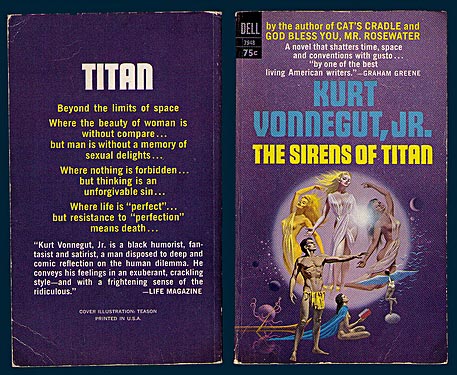Kurt Vonnegut Jr.
Completed 1/2/2014, Reviewed 1/3/2014
3 stars
I loved Vonnegut in high school. In my Modern American Lit class, we read “God
Bless You, Mr. Rosewater”, “Welcome to the Monkeyhouse”, and of course
“Slaughterhouse Five.” On my own, I read
“Jailbird” and “Slapstick. Picking up one
of his earliest novels thirty-five years later, I realized I had forgotten what
a bizarre, dark writer he was.
“Siren of Titan” has a crazy, convoluted plot that is quite
difficult for me to describe. It’s about
Malachi Constant, one of the richest but also most spoiled and morally bankrupt
people on earth. When his fortunes collapse,
he takes an offer to go to Mars to become an officer in their army. Constant’s adventures on Mars, and later
Mercury and Titan seem to be manipulated by Winston Niles Rumfoord, a man who
apparently knows the future, and moves through space making appearances on
earth every 50-some-odd days. Besides
Constant, Rumfoord manipulates the people of earth, starting a new religion,
the Church of God
Trying to write this review, I’ve realized this book is
really hard to write a review for. The
book is short. I can’t discuss the plot
too much because it moves quickly and gives away the ending. So I’ll focus on the ideas he’s conveying
through the story.
Clearly, Vonnegut is making a lot of statements in this book. First, he talks about the war machine. From my high school English class, I still
remember that Vonnegut was in WWII and survived the fire bombing of Dresden . He had some pretty intense feelings about
war. At least at the time he wrote the
novel, I think it’s easy to say that Vonnegut believes that people are tricked
into joining the army with promises of a fresh start, only to become killing
machines, nearly devoid of free will.
Any show of thinking on your own gets you punished.
Vonnegut was also an outspoken humanist. It’s clear from this story that he believes
that if there is a god, he’s indifferent, and doesn’t need our worship. If there should be a religion, it should be
one that dictates having compassion for each other, even the lowliest of
us. In the novel, the only way to do
this is to create a war event with such deplorable results that people are mortified
into shifting their beliefs to a new paradigm.
Lastly, I think it’s pretty obvious that he despised the
rich. That’s obvious from his main characters. Considering what a short book this is, the
characters are pretty fully realized.
And the three main characters, Rumfoord, Constant, and Beatrice, are
pretty deplorable people. There were
times where I felt pity for Constant as he is manipulated by Rumford, and for
Beatrice and her plight, but that didn’t last very long. The only character who is likable is Salo,
the robot. It is the only character who
seems to have human feelings. It does
not manipulate, or act out of revenge.
The end of the book is great. There’s an awesome twist which I won’t give
away. And reflecting on it, it makes me
mad that at least one other popular author stole the ending. I won’t give it away, because it will give
away the ending. But if you’ve read
popular SF from the ‘80s, you’ll know who it is as soon as you finish “Sirens”.
Whew, getting all that out coherently was tough.
I didn’t think this book was his best. But in coming up with a star rating, I had to
acknowledge the genius of Vonnegut, creating such a wild, dark ride, jam packed
with his philosophies in such a short novel.
I couldn’t give it 4 stars, because at the same time, it seemed
forced. I think he did a much better,
subtler job getting his messages across in later works. So I settled on 3 stars. It’s definitely worth a read. I think everyone should read some Vonnegut. Whether you agree with his beliefs or not, he
had a style of writing that should be experienced more than once.

Good review Stephen! A tough one to review owing to the deceptive shortness of the work, with the massive depth that it provides. The real genius of Vonnegut is the economy of means; a bit like poetry... haiku, straight up with a twist of dark humor.
ReplyDelete